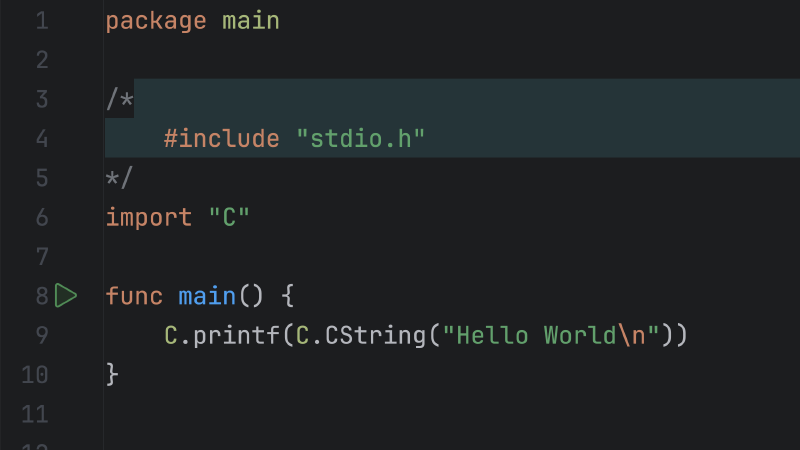Simple CGO examples
CGO is a way to call C code from Go. It helps call existing C libraries or for performance reasons. CGO is enabled by default but can be disabled with the -cgo build flag.
Below is a simple example of calling a C function from Go.
package main
/*
double add(double a, double b) {
return a + b;
}
*/
import "C"
import "fmt"
func main() {
fmt.Println(C.add(1, 2))
}
The C code is embedded in the Go code as a comment above import "C". The comment must start with /* and end with */. The C code must be valid.
The Go compiler compiles the C code and links the resulting object file with the Go code.
Here is an example of using an existing C library.
package main
/*
#include "math.h"
double add(double a, double b) {
return a + b;
}
*/
import "C"
import "fmt"
func main() {
fmt.Println(C.floor(C.add(1, 2.1)))
}
We call the floor function from the math.h library. The math.h library is included with the C compiler, so we don’t need to do anything special to use it.
CGO Hello World fail
Here is another example where we print “Hello World” from C.
package main
/*
#include "stdio.h"
*/
import "C"
func main() {
C.printf(C.CString("Hello World\n"))
}
However, the above seemingly straightforward example will fail to compile with the following enigmatic error:
cgo: ./exmaple.go:9:2: unexpected type: ...
The problem is that printf is a variadic function that can take a variable number of arguments. CGO does not support variadic functions. Even using Go variadic syntax will not work:
args := []interface{}{}
C.printf(C.CString("Hello World\n"), args...)
The workaround for this is to use another non-variadic function, such as vprintf, or to wrap the variadic C function in a non-variadic C function.
package main
/*
#include "stdio.h"
void wrapPrintf(const char *s) {
printf("%s", s);
}
*/
import "C"
func main() {
C.wrapPrintf(C.CString("Hello, World\n"))
}
C++ Hello World fail
Another issue with CGO is only C code can be called from Go. C++ code cannot be called from Go. The following code will fail to compile:
package main
/*
#include <iostream>
void helloWorld() {
std::cout << "Hello, World" << std::endl;
}
*/
import "C"
func main() {
C.helloWorld()
}
However, C++ code can be called from C, so we can write a C wrapper for the C++ code.
CGO real-world example
The following is an example of real-world usage of CGO, which uses Apple’s APIs to add a secret to the keychain.
package keystore
/*
#cgo LDFLAGS: -framework CoreFoundation -framework Security
#include <CoreFoundation/CoreFoundation.h>
#include <Security/Security.h>
*/
import "C"
import (
"fmt"
"unsafe"
)
const service = "com.fleetdm.fleetd.enroll.secret"
var serviceStringRef = stringToCFString(service)
// AddSecret will add a secret to the keychain. This application can retrieve this
// secret without any user authorization.
func AddSecret(secret string) error {
query := C.CFDictionaryCreateMutable(
C.kCFAllocatorDefault,
0,
&C.kCFTypeDictionaryKeyCallBacks,
&C.kCFTypeDictionaryValueCallBacks,
)
defer C.CFRelease(C.CFTypeRef(query))
data := C.CFDataCreate(C.kCFAllocatorDefault,
(*C.UInt8)(unsafe.Pointer(C.CString(secret))),
C.CFIndex(len(secret)))
defer C.CFRelease(C.CFTypeRef(data))
C.CFDictionaryAddValue(query, unsafe.Pointer(C.kSecClass),
unsafe.Pointer(C.kSecClassGenericPassword))
C.CFDictionaryAddValue(query, unsafe.Pointer(C.kSecAttrService),
unsafe.Pointer(serviceStringRef))
C.CFDictionaryAddValue(query, unsafe.Pointer(C.kSecValueData),
unsafe.Pointer(data))
status := C.SecItemAdd(C.CFDictionaryRef(query), nil)
if status != C.errSecSuccess {
return fmt.Errorf("failed to add %v to keychain: %v", service, status)
}
return nil
}
// stringToCFString will return a CFStringRef
func stringToCFString(s string) C.CFStringRef {
bytes := []byte(s)
ptr := (*C.UInt8)(&bytes[0])
return C.CFStringCreateWithBytes(C.kCFAllocatorDefault, ptr, C.CFIndex(len(bytes)),
C.kCFStringEncodingUTF8, C.false)
}
The C linker flags are specified with the #cgo LDFLAGS directive.
The CGO code uses a lot of casting and data conversion. Let’s break down the following segment:
(*C.UInt8)(unsafe.Pointer(C.CString(secret)))
C.CString converts a Go string to a C string. It is one of the CGO special functions to convert between Go and C types. See cgo documentation for more information.
unsafe.Pointer converts a C pointer to a generic Go pointer. And (*C.UInt8) casts the Go pointer back to a C pointer.
Unfortunately, CGO cannot cast a C string to a (*C.UInt8) directly. The following will fail to compile:
(*C.UInt8)(C.CString(secret))
We must go through an intermediate cast to unsafe.Pointer, representing a void C pointer.
Additional topics
Our custom C and Go code was always in the same file in the above examples. However, the C code can be in a separate file and linked to our Go executable.
Other getting started guides
- Recently, we explained how to build a Chrome extension without any additional tools.
- Also, we wrote a guide to creating a React Hello World app.
